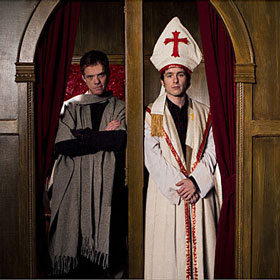Blue Like Jazz

2.5/5
Blue Like Jazz is a movie that really wants you to like it. It’s got a nice, easy coming-of-age storyline. It’s populated with very likeable characters, and they’re all portrayed by very likeable, capable actors. Even the story of how this film came to be is hard not to like; when a lack of funding halted production indefinitely in 2010, the filmmakers reached out to fans of the source material (a memoir by Donald Miller) through the crowdsourcing website Kickstarter and raised all necessary funds, and then some, and became The Little Movie That Could. If nothing else, this film has a very devoted following. And having viewed it, I can say it is extremely likeable.
Just don’t call it Christian Cinema. No, Blue Like Jazz is simply a film made by Christians. And it’s also about one young man’s struggle with his Christian faith. But, as director Steve Taylor explains on the film’s blog, the one classification he wants his film to avoid is that of “Christian Cinema” and all the trappings that genre implies. And that’s what makes this generally likeable film so enigmatic.
Blue Like Jazz is the story of Don (Marshall Allman), a nineteen-year-old boy who runs away from his small-town Baptist upbringing in Middle-of-Nowhere, Texas, to attend freaknik paradise Reed College in Portland, Oregon. And on his first day there, it’s apparent Don’s a long way from home; a guy dressed in a Pope outfit gives him a handful of condoms, and the lesbian friend he met in a co-ed restroom encourages him to keep his Baptist faith in the closet.
It doesn’t take long for Don to abandon his faith entirely and embrace the hedonistic culture of this Liberal (with a capital L) arts college, where every personal philosophy and mode of expression is accepted, except for the Christian faith. This is where Don starts to cuss and talk about sex and take drugs and do all manner of things that would normally diverge from the typical “Christian Cinema” oeuvre.
But what really makes the film stand out from others in the genre (Fireproof, October Baby, etc.) is the absence of proselytizing. The film is about faith, for sure, but it’s not preachy. Atheists and Christians alike are portrayed with an evenhandedness so pronounced that one could almost mistake the film for being secular. Almost. (Spoiler alert: Don reconnects with his faith in the end.)
Whether the filmmakers like it or not, Blue Like Jazz is wholly a Christian film. And they might do well to embrace being classified within that genre. As a “Christian” film, Blue Like Jazz is a revelation – a challenging, genre-bending little stroke of genius. Without that lens, the film is just pretty darn likeable.
RELATED ARTICLES
Get the most-revealing celebrity conversations with the uInterview podcast!







Leave a comment